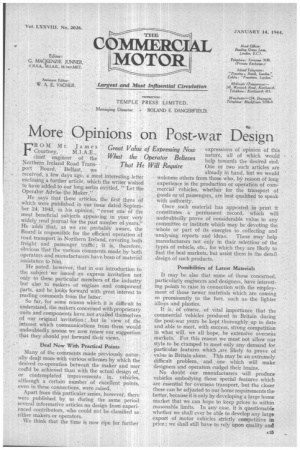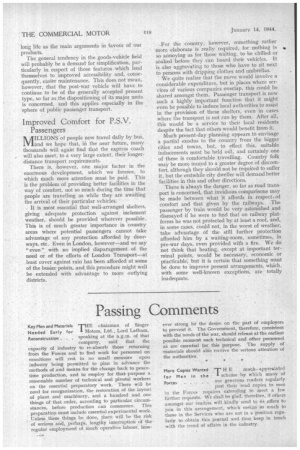More Opinions on Post-war Design
Page 17

Page 18

If you've noticed an error in this article please click here to report it so we can fix it.
R 0 M Mr. James Great Value of F Courtney, M.I . A. E. , chief engineer of the "Northern Ireland Road TransThat He port Board, Belfast, we ' received, a few days ago, a most interesting letter enclosing a further article, which the writer wished to have added to our long series entitled, " Let the Operator Advise the Maker."
He says that these articles, the first three of • which were published in our issue dated September 24, 1043, in his opinion, "cover one of the most beneficial subjects appearing in your very widely read journal for the past number of years." He adds that, as we are probably aware, the Board is responsible for the efficient operation of road transport inNorthern Ireland, covering both freight and passenger traffic; it is, therefore, obvious that the various comments made by both operators and manufacturers-have been of material assistance to him.
He noted, however, that in our introduction to the subject •we issued an express invitation not only to these particular members. of the industry • but also to makers of engines and component • parts, and he looks forward with great interest to reading comments from the latter. So far, for some reason which it is difficult to • understand,the makers concerned with proprietary units and components have not availed theniselves of our original invitation ; , but in view of the interest which communications from them would undoubtedly arouse we now renew our suggestion • that they should put forward their views.
Deal Now With Practical Points Many of the comments made previously naturally dealt more with various schemes by which the desired co-operation between the maker and user could be achieved than with the actual design of, or contemplated improvements in, vehicles, although a certain number of excellent points, even in these connections, were raised.
Apart from this particular series, however, there were published by us during the same period several informative articles on design from experienced contributors, who could not be classified as either makers or operators.
We think that the time is now ripe for further expressions of opinion of this nature, all of which would help towards the desired end. One or two 5uch articles are already in hand, but we would welcome others from those who, by reason of long experience in the production or operation of commercial vehicles, whether for the transport of goods or of passengers, are best qualified to speak with authority.
Once such material has appeared in print it constitutes a permanent record, which will undoubtedly prove of considerable value to any committee or institute which may be devoting the • whole or part of its energies to collecting and analysing reports and ideas: These may help manufacturers not only in their selection of the types of vehicle, etc., for which they are likely to find the best markets, but assist them in the detail design of such products.
Expressing Now erator Believes Will Require
Possibilities of Latest Materials It may be also that some of those concerned, particularly engineers and designers, have interesting points to raise in connection with the employment of those newer materials which are coming so prominently to the fore, such asthe lighter alloys and plastics.
It is, of course, of vital importance that the commercial vehicles produced in Britain during the post-war years be kept thoroughly up to date and able to meet, with success, strong competition in what will, we all hope, be extensive overseas markets. For this reason we must not allow our style to be cramped to meet only any demand for particular features which ,are likely to prove of value in Britain alone. This may be an extremely difficult problem, and one which will make designers and operators cudgel their brains.
No doubt our manufacturers will produce vehicles embodying those special features which are essential for overseas transport, but the closer these can be adjusted to our home requirements the better, because it is" only by developing a large home market that we can hope to keep prices to within reasonable limits. In any case, it is questionable whether we shall ever be able to develop any large export of motor vehicles strictly competitive in price ; we shall still have to rely upon quality and long life as the main arguments in favour of our products.
The general tendency in the goods-vehicle field will probably be a demand for simplification, particularly in respect of those features which lend themselves to improved accessibility and, consequently, easier maintenance. This does riot mean, however, that the post-war vehicle will have to continue to be of the generally accepted present type, so far as the dispositioning of its major units is concerned, and this applies especially in the sphere of public passenger transport.
Improved Comfort for P.S.V. Passengers
MILLIONS of people now travel daily by btr, and we hope that, in the near future, many thousands will again find that the express coach will also meet, to a very large extent, their longerdistance transport requirements.
There is, however, one major factor in the enormous development, which we foresee, to which much more attention must be paid. This is the problem of providing better facilities in the way of comfort, not so ranch during the time that people are travelling as while they are awaiting the arrival of their particular vehicles.
It is most essential that well-an-anged shelters, giving adequate protection against inclement weather, should be provided wherever possible. This is of much greater importance in country. areas where potential passengers cannot take advantage of any protection afforded by doorways, etc. Even in London, however—and we say "even" with no implied disparagement of the need or of the efforts of London Transport—at least cover against rain has been afforded at some of the busier points, and this procedure might well be extended with advantage to more outlying districts. -For the country, however, sornething rather more elaborate is really required, for nothing is so annoying as for those waiting, to be chilled or soaked before they can board their vehicles. It is also aggravating to those who have to sit next to persons with dripping clothes and umbrellas. We quite realize that the move would involve a considerable expenditure, but in places where services of various companies overlap, this could be shared amongst them. Passenger transport is now such a highly important function that it might even be possible to induce local authorities to assist in the provision of these shelters, even in cases where the transport is not run by them. After all, this would be a service to their local residents despite the fact that others would benefit from it.
Much present-day planning appears to envisage a partial exodus to the country from the bigger cities and towns, but, to effect this, suitable inducements must be held out and certainly one of these is comfortable travelling. Country folk may be more inured to a greater degree of discomfort, although they should not be required to suffer it, but the erstwhile city dweller will demand better facilities in this and other directions.
There is always the danger, so far as road transport is concerned, that invidious comparisons may be made between what it affords in respect. of comfort and that given by the railways. The passenger by train would be very, astonished and dismayed if he were to find that on railway platforms he was not protected by at least a roof, and, in some cases, could not, in the worst of weather, take advantage of the still further protection afforded him by a waiting-room, sometimes, in pre-war days, even provided with a fire.. We do not think that heating, except at important terminal points, would be necessary, economic or practicable", but it is certain that something must be done to improve present arrangements, which, with some well-known exceptions, are totally inadequate.




















































